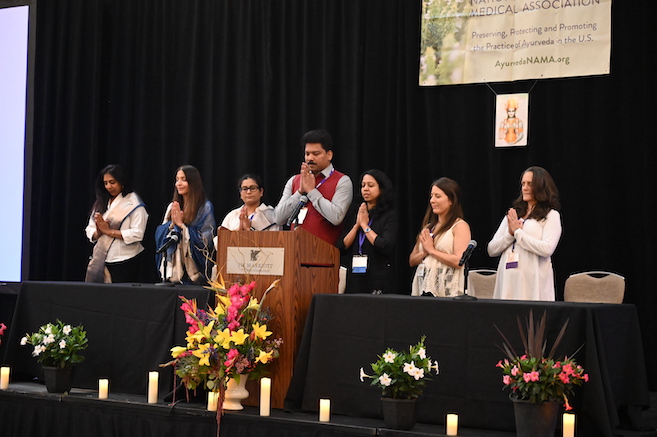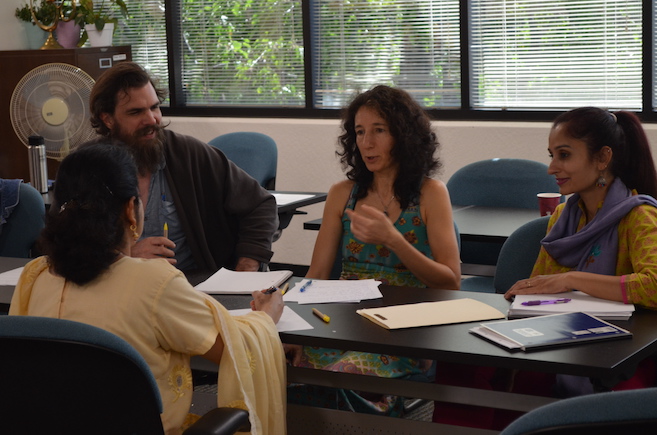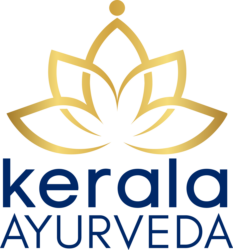We run our certification programs every spring and fall, and we continue to adapt them based on our students’ feedback, as well as to accommodate the latest requirements for accreditation. One of the challenges we encounter as an Ayurvedic school is to balance this spectrum of needs, as higher levels of requirements dictate certain restrictions on our program’s format, and impact the cost. We feel that our fall 2022 lineup is the best set of program options yet. Here’s why.
Industry standards – what, why and how

Alignment with National Ayurvedic Medical Association (NAMA)
Our Academy aligns with the National Ayurvedic Medical Association (NAMA), the largest Ayurvedic organization in the U.S., to provide industry standards. NAMA association by schools, and membership by professionals, are both optional. We opt into this alignment as we believe that standardization of the profession and licensure offers benefits to professionals as well as clients, making Ayurveda more accessible.
That said, it will take time for the industry to progress, and it’s not possible for all of the current prospective students to meet these requirements. Access to in person training is determined by proximity to an Ayurvedic school, or the time and financial resources to travel for potentially multiple stretches of time to visit a school. We do not wish to inhibit prospective students from completing our training programs, so we set an intention for our fall 2022 lineup to meet the needs of everyone.
2021 program requirement changes
We introduced online learning to Ayurvedic education in 2012. At that time, we knew this would make an Ayurvedic certification achievable for more students across the U.S. in regions without access to Ayurveda. Our motto was flexibility – all classes were live streamed and recorded, and hands-on training was available for those who were able to come in person. With minimum live class attendance, this flexible format met the requirements set forth by the National Ayurvedic Medical Association (NAMA) for a level I Ayurvedic Health Counselor (AHC) program.
These requirements changed in 2021 to require a new minimum number of in person training and clinical encounters. For the level II Ayurvedic Practitioner program, in person training was already a requirement, though the number of hours increased in 2021. NAMA introduced these requirements to elevate the training benchmark, as part of an accreditation and licensure agenda. We support this agenda, and have modified our program to provide this benchmark. We also offer alternative formats that do not meet NAMA requirements, but offer students an opportunity to be certified.

Explained: certification is not equivalent to NAMA membership
One of the most common questions we receive about NAMA has to do with how our programs qualify graduates. Key points to keep in mind:
- Certifications are awarded by schools.
- Professional Membership with NAMA is awarded by NAMA.
- For NAMA membership eligibility, a graduate must have completed a program that is NAMA-approved and pass the NAMA Board Exam.
- Our Academy offers program certifications for both NAMA-approved formats. The NAMA Track must be completed to be eligible for taking the NAMA Board Exam.
- Enrolled students do not have to wait until graduation to pursue NAMA membership. They can apply for Student Membership.
Introducing our fall 2022 program formats
Some of our students prefer to take their certification entirely online, while others wish to complete the requirements for NAMA eligibility. One of our trademarks has been the added flexibility to choose between online and in person attendance throughout the year. We wish to continue offering this flexibility, with a clear pathway for meeting NAMA’s requirements.
Our answer is three tracks: Online, Hybrid and NAMA.
We introduced this approach to all of our professional certifications, beginning with the Holistic Ayurvedic Coach (HAC) program – which is equivalent to the first 6 modules of level I AHC, and therefore outside of NAMA’s requirement threshold. It also seamlessly transitions into the AHC program for students who wish to upskill.
The three tracks of our certifications
All Online Track |
Hybrid Track |
NAMA Track |
|
All classes are attended via live streaming Available for: Holistic Ayurvedic Coach (HAC) – 300 Hours Level I Ayurvedic Health Counselor (AHC) – 600 hours |
Classes are attended in person and via live streaming Available for: Holistic Ayurvedic Coach (HAC) – 300 Hours Level I Ayurvedic Health Counselor (AHC) – 600 hours Level II Ayurvedic Practitioner (AP) – 910 Hours |
Classes are attended in person and via live streaming Practicums, Practical Immersions and Clinical Internships are attended in person based on NAMA requirements Available for: Level I Ayurvedic Health Counselor (AHC) – 600 hours Level II Ayurvedic Practitioner (AP) – 910 Hours |

The in person requirements: what to expect
A few important points about in person training with us:
- Not all of the in person training available in a program is included in the in person requirements for the NAMA Track. This is because NAMA’s definition of these requirements is specific about the type of training the student receives – specifically, clinical training that is supervised.
- The above point explains why our Hybrid Track exists – it offers in person training to the student based on what is convenient for the student, though it does not include the additional hours required to meet NAMA requirements.
- In person requirements for the NAMA Track are unique to each program, so we recommend reading our Course Catalog to learn more about these requirements.
Transitioning to the NAMA Track
One of our prerogatives when designing the layout of these program formats was transitioning. We understand that circumstances can change, and want to offer options for students who complete the All Online or Hybrid Tracks and later wish to fulfill the NAMA Track requirements for NAMA membership eligibility. Our course catalog outlines the add-ons required for completing this transition as well as the costs involved. Both currently enrolled students and graduates can make this transition, and our team is available to support students in achieving this goal.
In short: what the new tracks offer
- Track options are now crystal clear to help you pick what works best for you!
- All Online Track is 100% online.
- Hybrid Track is a blend of online and in person – flexibility!
- NAMA Track is specifically designed so that you can meet all the requirements to be eligible for taking the National Ayurvedic Medical Association’s Board Exam.
- Transition options are available for Counselor (AHC) and Practitioner (AP) students who wish to fulfill the requirements for our NAMA Track at a later time.





